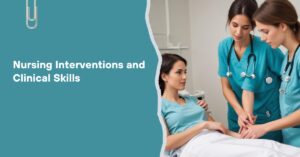Online Nursing Certification Courses: Your Gateway to Career Advancement
Table of Contents
ToggleAre you a Nurse Exploring Career Advancement? If you want to enhance your skill set, Advance your prospects, or specialize in healthcare, the convenience and flexibility provided by online education in today’s fast-paced environment, online nursing certification courses might be your ideal way to move forward in your nursing career. Let’s delve into their world and understand their benefits together.
What Are Online Nursing Certification Courses?
Online nursing certification courses are online educational programs that enable nurses to gain additional qualifications and expertise in specific areas of nursing practice, from advanced clinical skills development to leadership and management of healthcare settings.
Why Are They Important?
For many reasons, online nursing certification courses play a vital part in nurses’ professional growth and advancement.
- Skill Enhancement: These courses allow nurses to expand their expertise in various specialized areas of nursing practice, learn new techniques, and stay abreast of advancements to provide superior patient care.
- Career Advancement: Completing online certification courses can open new career possibilities for nurses. Employers value nurses with specific skills and credentials, which could result in promotions, salary increases, and greater job satisfaction.
- Convenience and Flexibility: Online courses offer convenience for nurses with busy schedules or other commitments who want to continue studying independently at their own pace without commuting across town to physical classrooms.
- Access to Specialized Training: Some fields of nursing may require specific, specialized training that is not always available locally. With online courses, nurses can access certification programs not offered locally.
- Professional Recognition: Earning certifications demonstrates a nurse’s dedication and ongoing education while increasing credibility with peers, patients, and employers.
Specializations Available in Online Nursing Certification Courses
Online nursing certification courses provide tailored instruction in various practice areas that meet healthcare providers’ diverse needs.
- Advanced Practice Nursing: These courses are intended for nurses looking to expand their clinical skills and knowledge to provide comprehensive patient care. Specialties may include nurse practitioners, anesthetists, midwives, and clinical nurse specialists.
- Nursing Informatics: Nursing informatics courses emphasize using technology and information systems to enhance patient care and healthcare outcomes. Nurses learn to utilize information systems to manage and analyze healthcare data, implement electronic health records (EHRs), and support clinical decision-making processes.
- Nurse Education: Nurse education courses equip nurses to become teachers and mentors within academic or clinical environments. Nurses learn teaching strategies, curriculum creation techniques, and evaluation methods that will allow them to educate future generations of nurses effectively.
- Nursing Leadership and Management: These courses are tailored specifically for nurses seeking leadership positions within healthcare organizations. Nurses learn principles of leadership, management theory, financial administration, and strategic planning techniques designed to lead teams toward organizational outcomes while increasing individual effectiveness.
- Pediatric Nursing: Pediatric nursing courses address the care of infants, children, and adolescents in various healthcare settings. Nurses learn about growth and development, pediatric illnesses, family-centric care approaches, and pediatric-specific interventions.
- Gerontology Nursing: Gerontology nursing courses equip nurses to care for older adults and meet the unique healthcare needs associated with aging. Students learn about age-related changes, chronic conditions, palliative care services, and strategies that promote healthy aging.
Accreditation and Credibility of Online Nursing Certification Courses
When selecting an online nursing certification course, verifying that the program has been accredited by several renowned accrediting bodies, such as the Accreditation Commission for Education in Nursing (ACEN) or the Commission on Collegiate Nursing Education (CCNE), is crucial. Accreditation ensures that programs adhere to stringent quality standards that prepare students for successful careers as registered nurses.
Accredited programs undergo an intensive review process encompassing factors like curriculum quality, faculty qualifications, student support services, and educational outcomes. By choosing an accredited program, nurses can rest easy knowing their certification will be recognized by employers, professional organizations, licensing boards, and licensing boards.
Overall, online nursing certification courses allow nurses to pursue areas of interest, advance their careers, and make a tangible difference in patient care. By choosing accredited programs aligning with their career goals, nurses can embark on an incredible lifelong learning and professional growth journey within this dynamic nursing field.
Factors To Consider While Choosing The Best Online Nursing Certification Courses
When choosing an online nursing certification course, consider the following factors:
- Accreditation status
- Curriculum content and relevance to your career goals
- Faculty credentials and expertise
- Student support services
- Personal goals and career aspiration
Requirements for Online Nursing Certification Courses
Before signing up for an online nursing certification course, you must ensure you meet specific requirements.
Prerequisites
These are the things you need to have or do before you can even think about enrolling in a course:
- Valid Nursing License: To take an NAC course, one must possess a valid nursing license. Without such, taking certification courses would not make sense.
- Clinical Experience: Before enrolling in more advanced training programs, some programs require at least some clinical experience as a nurse in a clinical environment. They want to ensure you’ve acquired hands-on knowledge before beginning more in-depth education programs.
- Relevant Coursework: Depending on the specialty you want to pursue, certain classes or experience in specific fields might be needed – much like building on what you already know.
Eligibility Criteria
These are the factors that determine whether or not you can enroll in a specific course:
- Educational Requirements: Certain nursing courses require participants to hold at least a bachelor’s degree to participate in their programs to ensure they possess an academic foundation to build success.
- Work Experience: Before enrolling, some programs require applicants to possess at least some prior nursing experience to apply. Employers look for nurses with extensive hands-on knowledge in this care area.
- Licensure Status: Ensure you are licensed to practice nursing in your state or country before enrolling. Some courses require an active nursing license before enrolling in specific classes. Length and Flexibility of Online Nursing Certification Courses
- Two critical considerations emerge when comparing online nursing certification courses with traditional programs: duration and flexibility.
Duration and Flexibility of Online Nursing Certification Courses
Regarding online nursing certification courses, two key factors stand out: how long they take to complete and how flexible they are.
Comparison with Traditional Programs
Online nursing certification courses often offer more flexibility compared to traditional in-person programs. Here’s how they differ:
- Flexibility: With online courses, you can study whenever and wherever it suits you best. Whether you’re working full-time, juggling family responsibilities, or prefer to study at odd hours, online courses can accommodate your schedule.
- Pace of Study: In traditional classroom-based programs, you’re typically locked into a set schedule. But with online courses, you can progress at your own pace. This means you can speed through material you’re already familiar with or take your time to digest complex concepts.
- Duration: The length of an online nursing certification course can vary depending on factors like the program’s structure and availability. Most online courses can be completed within a few months to a year. This is often quicker than traditional programs, which may span several years.
Self-paced vs. Structured Learning
Online nursing certification courses offer different approaches to learning:
- Self-paced Learning: Many online courses are self-paced, meaning you control your learning journey. You can decide when to start, how much time to dedicate to each module, and when to take breaks. This flexibility is ideal for busy professionals balancing studying with work and other commitments.
- Structured Learning: Some online courses follow a more structured format with set deadlines, assignments, and group discussions. While this might feel more like a traditional classroom experience, it still offers the convenience of online learning. Structured courses can provide a sense of accountability and community, motivating some learners.
Cost and Financial Aid Options
Tuition Fees
The cost of online nursing certification courses varies widely depending on factors such as the institution, program length, and specialization. Tuition fees typically range from a few hundred to several thousand dollars.
Scholarships and Grants
Financial aid options for online nursing certification courses may include scholarships, grants, and tuition reimbursement programs offered by employers or professional organizations. Additionally, federal financial aid, such as Pell Grants or student loans, may be available to eligible students.
Job Opportunities and Career Advancement
One of the most significant advantages of completing an online nursing certification course is the wide range of job opportunities and the potential for career advancement it can open up.
Increased Marketability
- Nurses can make themselves more attractive to employers by obtaining specialized certifications through online courses.
- These certifications demonstrate a commitment to professional development and a willingness to go above and beyond the basic requirements.
- Employers often value nurses with specialized skills, as they can contribute to improved patient care, increased efficiency, and better outcomes.
Potential Salary Increments
- Nurses with specialized certifications may be eligible for higher salaries and other incentives.
- Many healthcare organizations offer salary differentials or bonuses to nurses with certifications in high-demand areas.
- Additionally, specialized certifications can lead to promotions and advancement opportunities in nursing.
Expanded Scope of Practice
- Specialized certifications can expand a nurse’s scope of practice, allowing them to take on more responsibilities and pursue new career paths.
- For example, a nurse who completes a certification in nurse education may be eligible to work as a nurse educator, teaching future generations of nurses.
- Similarly, a nurse who obtains a certification in nursing informatics may transition into a role as a healthcare informatics specialist, leveraging technology to improve patient care and outcomes.
Continuing Education and Lifelong Learning
- Online nursing certification courses are just the beginning of a nurse’s lifelong learning and professional development journey.
- Nurses who complete certification courses can continue to build on their skills and knowledge through additional training, workshops, and continuing education opportunities.
- By staying current with the latest developments in their field, nurses can remain competitive in the job market and position themselves for long-term career success.
Challenges and Tips for Success
- Time Management
Challenge: Balancing work, family, and studies can be challenging, especially with the flexibility of online courses.
Tip
- Create a study schedule and stick to it.
- Set aside dedicated time each day or week for coursework, prioritizing tasks based on deadlines and importance.
- Use time management tools and techniques to stay organized and focused.
2. Technical Difficulties
Challenge: Dealing with technology issues or navigating online learning platforms can frustrate and disrupt your studies.
Tip
- Familiarize yourself with the technology before starting the course.
- Practice using the learning platform and troubleshoot any issues in advance.
- Contact technical support or your instructor if you encounter any problems, and don’t hesitate to ask for help.
3. Self-Motivation
Challenge: Staying motivated and disciplined when studying independently can be challenging, especially without the structure of traditional classroom settings.
Tip
- Set clear goals and objectives for your studies, and remind yourself why you’re pursuing certification.
- Break down larger tasks into smaller, manageable steps, and celebrate your progress.
- Find ways to stay motivated, such as rewarding yourself for completing milestones or connecting with classmates for support and encouragement.
4. Communication and Collaboration
Challenge: Online courses can feel isolating, making communicating with instructors and classmates or collaborating on group projects difficult.
Tip
- Participate in online discussions, forums, and virtual study groups to engage with your peers and instructors.
- Use communication tools such as email, messaging apps, or video conferencing to stay connected and collaborate on assignments.
- Contact your instructor or classmates if you have questions or need clarification on course material.
5. Managing Workload and Stress
Challenge: Balancing coursework with other responsibilities can lead to feelings of overwhelm and stress.
Tip
- Prioritize self-care and well-being by taking breaks, exercising, and practicing relaxation techniques.
- Break tasks into smaller, manageable chunks and tackle them individually to avoid feeling overwhelmed.
- Don’t hesitate to reach out for support from friends, family, or mental health professionals if you’re struggling to cope with stress or anxiety.
What is the best certificate for nursing?
The best nursing certificate depends on your career goals and interests. Some popular options include certifications in advanced practice nursing, nursing informatics, and nursing leadership and management.
What is the best qualification for nursing?
The “best” qualification for nursing can vary depending on the type of nursing role you’re aiming for and your career aspirations. However, some familiar qualifications are highly valued in the nursing profession.
- Bachelor of Science in Nursing (BSN)
Description: A BSN is a four-year undergraduate degree program that provides comprehensive education in nursing theory, practice, and clinical skills.
1. Master of Science in Nursing (MSN)
Description: An MSN is a graduate-level degree program that allows nurses to specialize in a particular area of nursing practice, such as nurse practitioner, nurse educator, or nurse administrator.
2. Doctor of Nursing Practice (DNP) or Doctor of Philosophy (Ph.D.) in Nursing
Description: A DNP or Ph.D. in Nursing is a terminal degree program that prepares nurses for leadership, research, and advanced clinical practice roles.
What is the shortest nursing course?
What is the Shortest Nursing Course?
The shortest nursing course is typically a Certified Nursing Assistant (CNA) program. Here’s what you need to know:
Certified Nursing Assistant (CNA) Program
- Duration: A CNA program can typically be completed in as little as 4 to 12 weeks, depending on the specific program and institution.
- Description: CNA programs provide basic training in nursing skills and patient care. Students learn essential skills such as taking vital signs, assisting with activities of daily living, and providing bedside care.
- Scope of Practice: CNAs have a limited scope of practice compared to registered nurses (RNs) or advanced practice nurses. They work under the supervision of licensed nurses. They are primarily responsible for providing primary care and support to patients in healthcare settings such as hospitals, nursing homes, and long-term care facilities.
- Certification: Upon completing a CNA program, students must pass a competency exam to become certified nursing assistants. Once certified, CNAs are eligible to work in various healthcare settings and may pursue further education and training to advance their careers in nursing.
What Type of Nurse is Most in Demand?
Nurses play a vital role in healthcare. Certain types of nurses are more in demand than others. Here’s a closer look at the types of nurses that are highly sought after in today’s healthcare industry:
- Critical Care Nurses
Description: Critical care nurses specialize in providing care to patients who are critically ill or injured, often in intensive care units (ICUs) or emergency departments.
Skills Needed: Critical care nurses must have advanced assessment and critical thinking skills and the ability to recognize and respond to changes in patient conditions quickly.
- Emergency Nurses
Description: Emergency nurses work in emergency departments and urgent care centers, providing rapid assessment and treatment to patients with acute illnesses or injuries.
Skills Needed: Emergency nurses must be skilled in triage, trauma care, and rapid decision-making, as well as be able to work effectively under pressure.
- Nurse Anesthetists
Description: Nurse anesthetists are advanced practice nurses administering anesthesia and managing patients’ airways during surgical procedures.
Skills Needed: Nurse anesthetists must have advanced knowledge of pharmacology, anesthesia techniques, and patient monitoring, as well as solid communication and teamwork skills.
- Nurse Practitioners
Description: Nurse practitioners (NPs) are advanced practice nurses who provide primary and specialty care to patients of all ages, including diagnosing and treating illnesses, prescribing medications, and managing chronic conditions.
Skills Needed: Nurse practitioners must have advanced clinical knowledge and skills as well as solid communication and interpersonal skills to provide comprehensive, patient-centered care.
The Bottomline
Online nursing certification courses offer nurses a convenient and flexible way to enhance their skills, advance their careers, and pursue their professional passions. Choosing the right program and committing to lifelong learning can unlock new opportunities for personal and professional growth in the dynamic nursing field.






